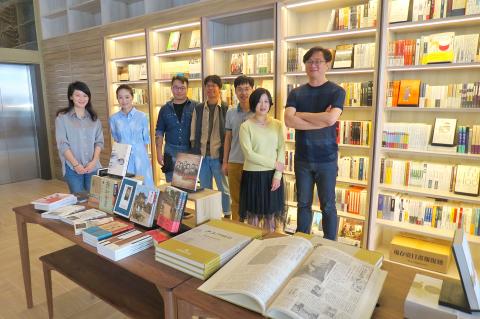One of Taiwan’s oldest and largest bookstores is to reopen under new ownership next month in Taichung, after being closed for 21 years.
Located on the corner of Taiwan Boulevard and Shifu Road in Taichung’s Central District (中區), Central Bookstore opened on Jan. 3, 1927, during the Japanese colonial period. The store was opened by the Taiwanese Cultural Association, which used the venue to host meetings of pro-democracy activists and to help develop a localized culture.
It was closed in 1998, with its owners citing financial difficulties. The space has since been used as a wedding gown shop, a convenience store and a motorcycle helmet shop.

Photo: Su Meng-chuan, Taipei Times
In 2016, the Shang Shan Human Culture Foundation obtained the rights to the building following an architect’s Facebook campaign to save it from demolition. Over the next three years, the foundation had the three-story building renovated in preparation for the bookstore’s reopening.
“The new Central Bookstore won’t be just a bookstore. It will have spaces for reading, exhibitions and talks, dining and other cultural activities. It will carry out the Central Bookstore’s mission of promoting localization and cultural awareness,” the foundation said.
The original Central Bookstore had been a publisher as well as a retail store, ran its own magazine and hosted talks, it said.
For many years, the store was a place where academics and other locals would buy books and meet friends, so it has a special place in the hearts of Taichung people, the foundation said.
The now-renovated building with its gold sign above the entrance has been attracting the attention of passersby, and many expressed anticipation of the bookstore’s reopening, the foundation said.
The first floor of the new store will focus primarily on books about Taiwanese culture and Taichung, will have a space for exhibitions and will also showcase selected local arts items, it said.
The second floor will have a play space for parents and young children, and will house lifestyle books and dining options, the foundation said, adding that the third floor would house literature and history works, as well as a space for public talks.
“Unlike at conventional bookstores, when people walk through the doors they won’t be hemmed in by a sea of books. Maintaining the building’s unique circular architecture, we avoided walling things in,” it said. “We kept the area next to the large French windows as a space for book lovers to sit and read.”
Fan Yun-lung (繁運隆), who is head of business operations at the bookstore, said he wants to preserve the store’s strong reputation and carry on the its mission of promoting local culture.
Store vice chairman Shen Chen-hui (沈貞慧) said that the store would emphasize cultural exchange and would not carry books such as educational texts or other “utilitarian” works.
The store will start trial operations in November and formally open in January, he said.

Alain Robert, known as the "French Spider-Man," praised Alex Honnold as exceptionally well-prepared after the US climber completed a free solo ascent of Taipei 101 yesterday. Robert said Honnold's ascent of the 508m-tall skyscraper in just more than one-and-a-half hours without using safety ropes or equipment was a remarkable achievement. "This is my life," he said in an interview conducted in French, adding that he liked the feeling of being "on the edge of danger." The 63-year-old Frenchman climbed Taipei 101 using ropes in December 2004, taking about four hours to reach the top. On a one-to-10 scale of difficulty, Robert said Taipei 101

Nipah virus infection is to be officially listed as a category 5 notifiable infectious disease in Taiwan in March, while clinical treatment guidelines are being formulated, the Centers for Disease Control (CDC) said yesterday. With Nipah infections being reported in other countries and considering its relatively high fatality rate, the centers on Jan. 16 announced that it would be listed as a notifiable infectious disease to bolster the nation’s systematic early warning system and increase public awareness, the CDC said. Bangladesh reported four fatal cases last year in separate districts, with three linked to raw date palm sap consumption, CDC Epidemic Intelligence

Two Taiwanese prosecutors were questioned by Chinese security personnel at their hotel during a trip to China’s Henan Province this month, the Mainland Affairs Council (MAC) said yesterday. The officers had personal information on the prosecutors, including “when they were assigned to their posts, their work locations and job titles,” MAC Deputy Minister and spokesman Liang Wen-chieh (梁文傑) said. On top of asking about their agencies and positions, the officers also questioned the prosecutors about the Cross-Strait Joint Crime-Fighting and Judicial Mutual Assistance Agreement, a pact that serves as the framework for Taiwan-China cooperation on combating crime and providing judicial assistance, Liang

US climber Alex Honnold left Taiwan this morning a day after completing a free-solo ascent of Taipei 101, a feat that drew cheers from onlookers and gained widespread international attention. Honnold yesterday scaled the 101-story skyscraper without a rope or safety harness. The climb — the highest urban free-solo ascent ever attempted — took just more than 90 minutes and was streamed live on Netflix. It was covered by major international news outlets including CNN, the New York Times, the Guardian and the Wall Street Journal. As Honnold prepared to leave Taiwan today, he attracted a crowd when he and his wife, Sanni,